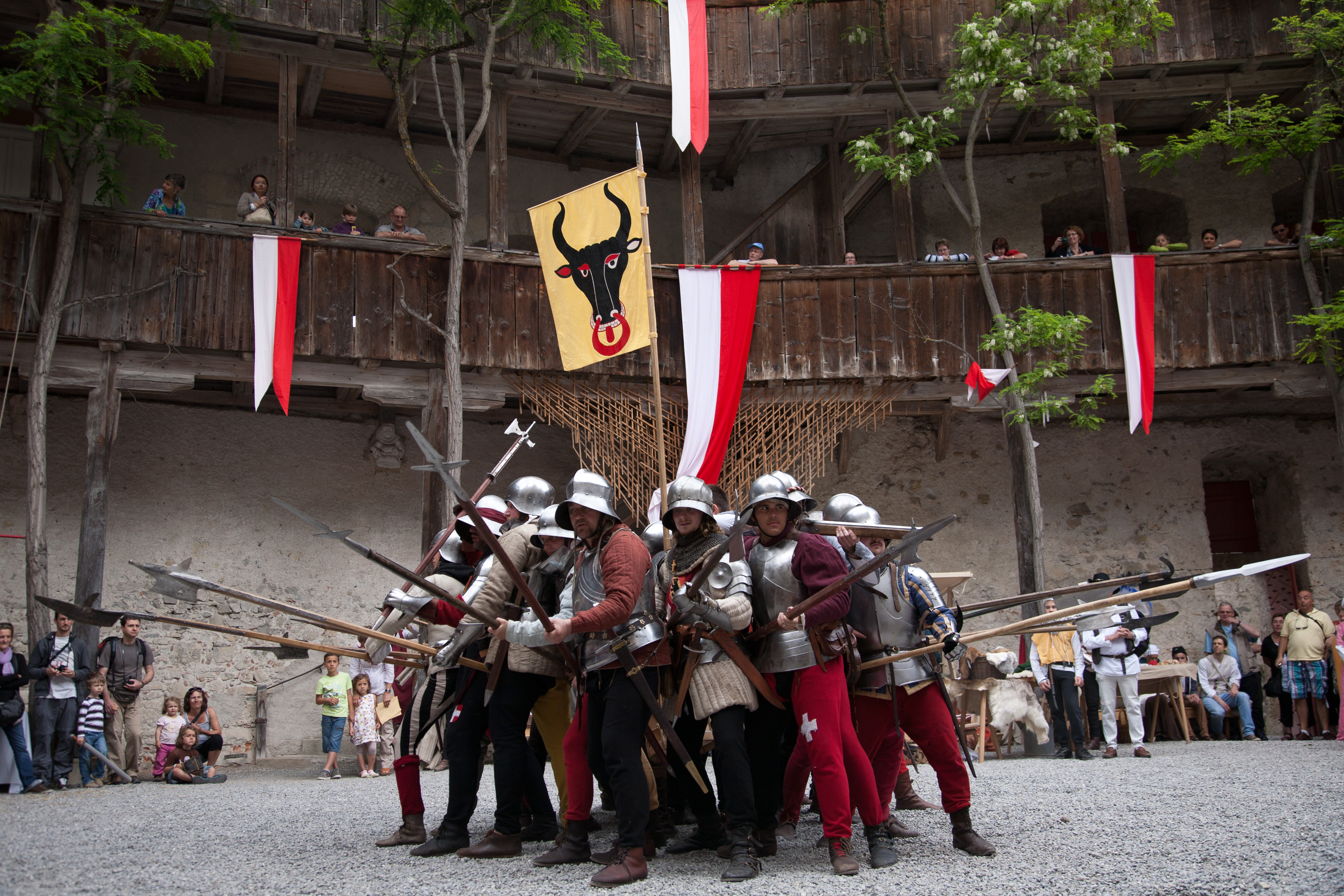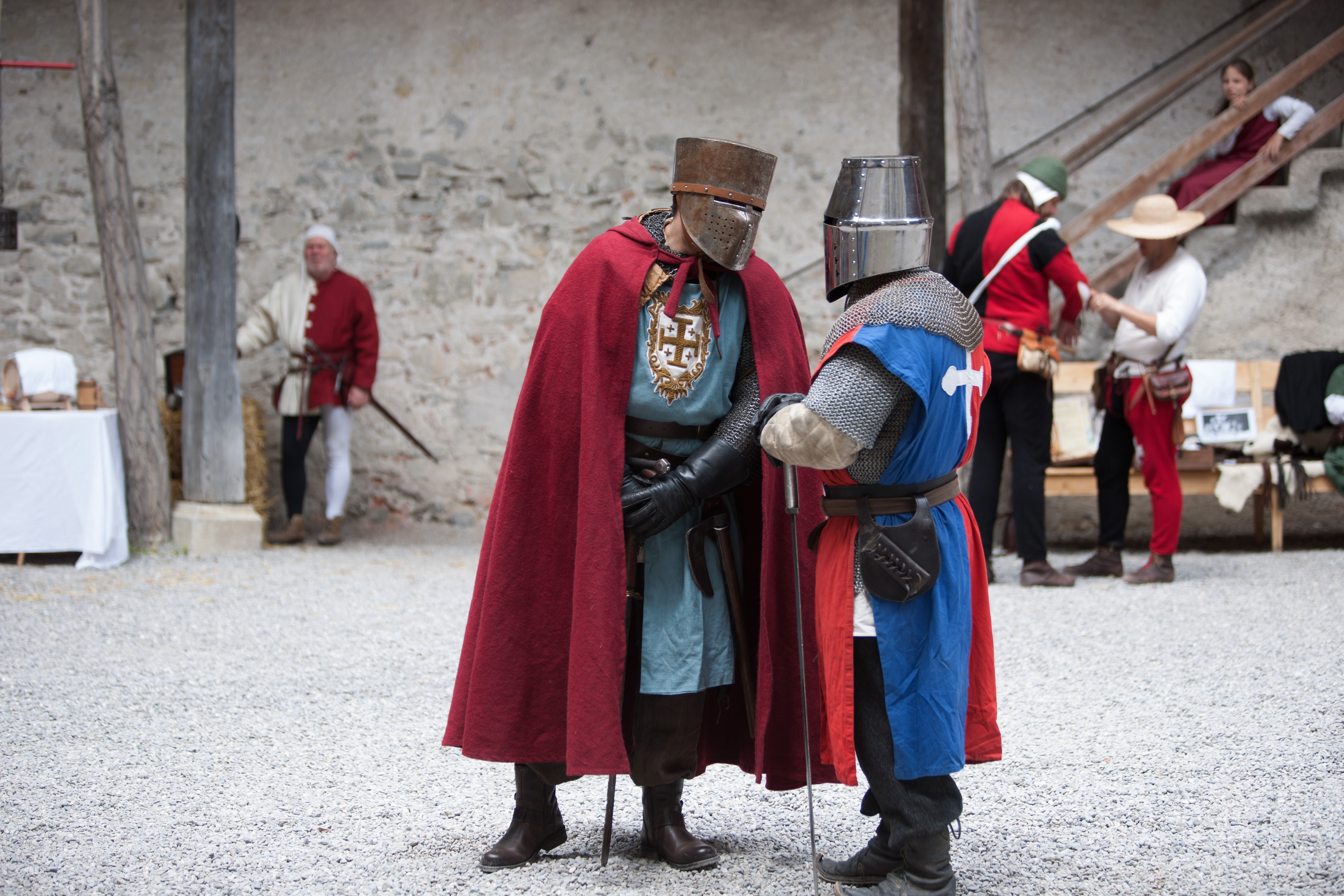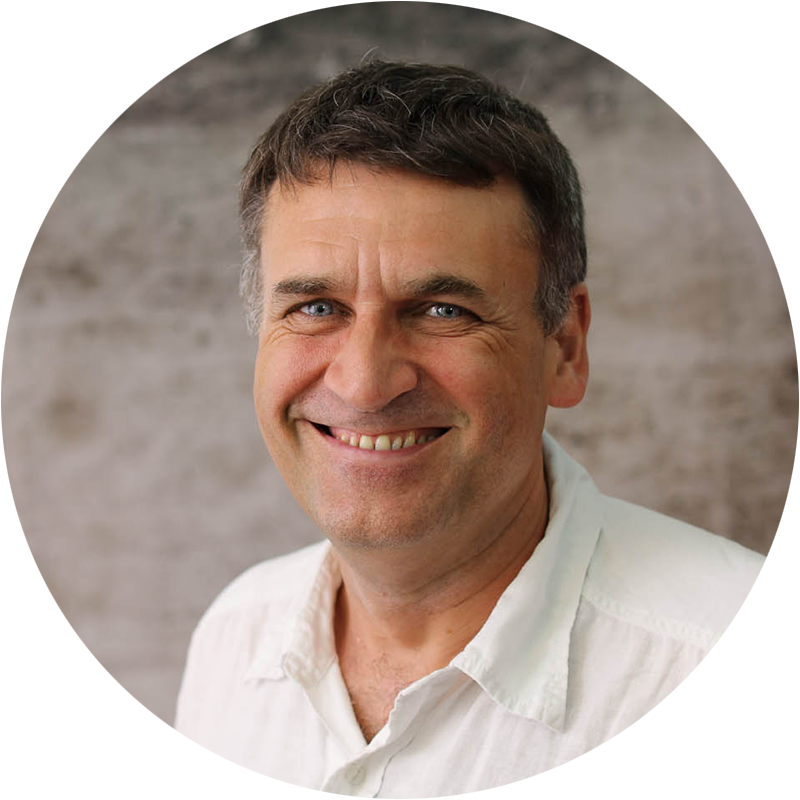“The Middle Ages are Europe’s common heritage”

Sometimes organised just to attract tourists, medieval re-enactments can also be the result of lengthy research, a fact the academic world should not ignore, according to Olivier Renaudeau, a curator at the army museum in Paris.
St John’s feast in Gruyères in western Switzerland, a historical market in Ardez – a village in the Engadine Valley – or a medieval show in Burgdorf outside the capital Bern: these are just a few of the events people can attend in Switzerland on regular basis to find out more about suits of armour, the secrets of cooking in the Middle Ages or how people dressed in the 15th century.
But why have groups interested in re-enacting the past become more common in recent years? For Renaudeau, these reconstructions are a sign that people want to get in touch with a common heritage.
swissinfo.ch: Over the past few years, there seem to be more and more historical re-enactments, especially medieval ones. Are they are a recent phenomenon?
Olivier Renaudeau: There are some places in Europe that have very old traditional festivals with a commemorative background. In France, for example, there has been a festival in Orleans since 1429 to celebrate the city’s liberation by Joan of Arc. Ribeauvillé in Alsace has one that dates back to the 14th century.
In the 19th century, under the influence of the Romantic movement, there were more and more of these events, although not always on a regular basis.
The historical festivals that most people know about or have seen are generally more recent. They date back to the 1980s, when cities were looking to attract tourists.

More
Linked by a passion for the Middle Ages
swissinfo.ch: Is there also a quest for identity in these events?
O.R.: There may be a desire to relive an idealised past, but the quest for an identity is actually a fairly minor element. These events were mainly aimed at helping to revive villages and towns that tourists no longer visited and to create an event where people could get together.
swissinfo.ch: So what has changed since the 1980s?
O.R.: After the first events were staged – mainly by tourist offices – associations began to appear for people interested in the Middle Ages. The event organisers and the associations then often went their separate ways.
The tourism specialists were interested in setting up events but were not too concerned with historical accuracy. The associations, on the other hand, took a research approach, some of it approaching experimental archaeology. The first groups to do this were English. In Switzerland, the Compagnie de Saint Georges, created in 1988, was also one of the pioneers in Europe.
swissinfo.ch: Why are people attracted to the Middle Ages?
O.R.: Everyone has probably pretended to be a knight when they were little. But what I have noticed is the international dimension of the Middle Ages. Those who do re-enactments all seem to know the musical repertory from much of Europe from that time.
Costumes, art forms, music and writing were widely circulated during the Middle Ages. During the 15th century, a Swiss didn’t dress much differently to an Englishman. It’s a sort of common heritage to all of Europe. Everyone can recognise something of themselves in this legacy.
The same thing is happening for ancient times. There are plenty of groups doing re-enactments, especially Roman. In this case there is a common heritage as well.
swissinfo.ch: Aren’t people idealising this past?
O.R.: I’m not sure you can talk about an idealised Middle Ages. I think most people with this hobby are generally aware of what it was really like at that time. In other words, that it was a dangerous, insecure and socially difficult period.
In Switzerland some historical events are part of old traditions. The Tellspiele in Interlaken have been around for over a century, Geneva’s Escalade since 1926 and Zurich’s Sechseläuten since the beginning of the 20th century in its current form.
Elsewhere, the medieval days in Saint-Ursanne and the Augusta Raurica (Augst) Roman festival are much more recent. “These events help these towns highlight their architectural legacy,” said Switzerland Tourism spokeswoman Véronique Kanel.
Switzerland Tourism does not have any statistics that can help measure the impact of these events, but Kanel says they are becoming more popular. The medieval days in Saxon, canton Valais, had 10,000 visitors in 1991; in 2011, it was 24,000.
swissinfo.ch: Have literature and films heightened this interest in the Middle Ages?
O.R.: Certainly, especially literature, which helped create interest at the start of the medieval movement. A lot of youngsters became interested because they wanted to own a big sword like the heroes in the Lord of the Rings.
When they began, these groups only had a fairly vague idea of the Middle Ages. They just wanted to re-enact the medieval life, without necessarily realising that the Middle Ages lasted 1,000 years. But as they developed their activities, they focused on more specific periods.
The Compagnie de Saint Georges, for example, re-enacts the life of Burgundian artillery troops at the end of the 15th century, during the wars between the Swiss and the Duke of Burgundy.
swissinfo.ch: Why be so specific?
O.R.: When you look at the subject more closely, you realize that you can date clothing, trends or objects to within a timeframe of ten to 20 years. In the Middle Ages, fashion evolved as fast as it does today. So if you want historical precision, you have to focus on a specific period.
swissinfo.ch: What does the academic world think of these re-enactments?
O.R.: Academics tend to consider these enthusiasts as a little naive in their approach. This is not far off the mark when you consider some of these events pay little attention to history.
But I think that academics should pay more attention to these groups because they are often the first people to read their research and they review anything that concerns their favourite period especially carefully.
swissinfo.ch: How do you explain this lack of interest when these groups could actually help pass on historical knowledge?
O.R.: Since the 1970s, academics have paid more attention to how people thought at the time and to social phenomena. These are elements that are hard to include in a re-enactment. This is also why historians have been less interested. If academics are interested, it is mostly in the field of sociology. Historians have yet to grasp the importance of the re-enactment groups.
Museums and heritage sites are more open. They have realised that it’s a way to liven up their premises and encourage visitors to have a different kind of contact with objects that are normally locked away behind glass doors.
(Translated from French by Scott Capper)

In compliance with the JTI standards
More: SWI swissinfo.ch certified by the Journalism Trust Initiative

You can find an overview of ongoing debates with our journalists here. Please join us!
If you want to start a conversation about a topic raised in this article or want to report factual errors, email us at english@swissinfo.ch.